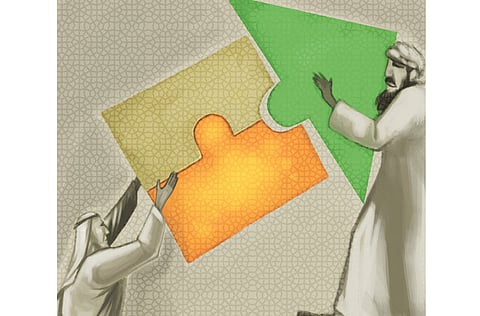Gulf political structures surprisingly resilient
The key test of any system is its ability to both cope with changes, and offer fulfilment to its citizens

The political systems in the Gulf have shown surprising resilience in coping with the powerful social changes forced on them by rapid economic development. The rulers have embraced a broadly liberal strategy of encouraging economic growth and welcoming modernisation, while at the same time retaining their powers. This combination of rapid social change and slow political change gave rise to fears a few years ago that the systems would fail, but this has not happened. The successful ability of the rulers in both leading and also listening to their peoples' concerns is the key to their success. The leadership has managed to work with civil society organisations, professional bodies, intellectuals and many other strands of society to build a coherent system of governance which is proving very durable.
The UAE, like any of the Gulf states, is wrestling with the three political strands of opinion. The liberal leadership and majority have to contend with both a conservative backlash and Islamic ideology. The debate between these three visions of the future is the core of Gulf politics, and where the leadership has been successful in setting out its view.
In the UAE, the national population is set to grow very rapidly indeed, as 65 per cent of the population which is under 25 years old take their full place in society. They will have very different aspirations from their parents, as the internet, satellite TV and much better education has positioned the new generation to make much more specific demands of their society and political systems than their parents.
Well aware
But a serious clash is unlikely. The UAE leadership is well aware of the wave of young people coming into society, and has been working to listen to what they want, and has also been preparing the economy to be large enough to offer them the hundreds of thousands of jobs that they will be seeking in the next 10 years.
However, there has been a real problem in the failure to reinforce the UAE national identity among many young nationals. This led to all sort of important social and educational initiatives following the Year of UAE Identity in 2008. These are designed to stop the drift away from UAE values and social standards, because if such a drift continued, the natural social cohesion of the small UAE population could be dangerously threatened. This strategy of adopting change while also using conservative elements to reinforce the national identity has been well tested.
As Her Highness Shaikha Fatima Bint Mubarak, Chairperson of the General Women's Union, put it last year: "The key to long-term success is the merging of heritage, conservatism, and modernity". However, she was also very clear about the inevitability of change, spelling out that "those who resist change stop when the realities of change become clear to them. Experience has taught us that prejudging the outcome of change does not affect the ongoing march of development".
The key test of any political system is its ability to both cope with changes, and also offer fulfilment to its citizens. These are demanding tests, requiring continual shifts in both the government's plans as well as in expectations from the citizens of the government. The UAE has found this flexibility without building any major political change to the country's structure of government, which indicates that the system has substantial reserves of political skill and governmental effectiveness.
Of course, the debate on how the political system can develop is lively, and some UAE thinkers want the whole process to move a lot faster. Ebtisam Al Kutbi, Assistant Professor of Political Science at UAE University, has been very clear over years, regularly calling for recognition of the importance of active citizenship based on two basic elements: equality in rights and duties, and effective participation in political, economic, social and cultural life.
The firebrand professor has spoken in several forums of the need for reform. A year ago at the Emirates Centre for Strategic Studies and Research, she defined the route to active citizenship as requiring the following conditions:
1. Civil rights including personal freedom and security, the right to private property, and equality before the law.
2. Political rights including election and nomination of representatives, to form political parties, to influence political decisions by acquiring and distributing information, the right to hold public posts and the right to peaceful assembly.
3, Economic and social rights including the right to work in fair conditions, minimum welfare and education.
She also emphasised that citizenship was not just about rights, but also included duties such as paying tax, doing military service and respect for the law and others' freedom and privacy. But more importantly than the letter of the law, Ebtisam spoke of the importance of commitment from citizens to their country, and their willingness to both feel that commitment and to take an active part in society.
One of the dangers Ebtisam recognised was "the monopoly by a small group of political and economic elites in society" that leads to "unbalanced citizenship" and "dissatisfaction among those who have not enjoyed such opportunities or resources which may reduce the connection between the majority and the country. This may cause them to withdraw to the margins of society and lead a life of incomplete citizenship".


